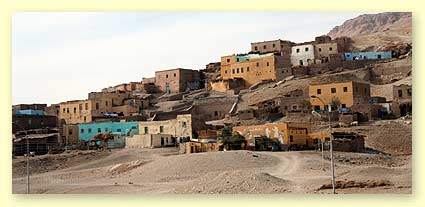
This morning I received an alarming email from my friend Golo, a great French cartoonist who has been living in Egypt since the 1970s. Golo lives in Gurna (Qurna – in Upper Egypt the letter “qaf” is pronounced “gaf”), the small village on the other bank of the Nile from Luxor, where he runs a NGO for local children. Gurna is a famous village because it sits atop a major archeological site, including several tombs. Golo writes that the longstanding government efforts to vacate and demolish Gurna village are coming to a showdown, with electricity to the area being cut off this week:
Mardi 25 novembre à 11 h, les autorités ont coupé, sans préavis, l’alimentation électrique aux habitants des collines de Gurnah et ont fait enlever les cables d’alimentation.
Les familles, hommes, femmes, ENFANTS, qui n’avaient pu arriver à un accord pour leur relogement, sont donc brutalement condamnés à la bougie (on ne trouve pas de pétrole pour alimenter les lampes). Ces villageois payaient pourtant leurs notes d’électricité.
Ne restent fournis en électricité que les archéologues et les sites touristiques.
Les habitants ont le sentiment d’habiter à Gaza et non en Egypte. Ils s’étaient dirigés vers l’hôpital pour entamer une grève de la faim mais les portes du bâtiment leur ont été fermées.
My translation: On Tuesday 25 November at 11am, the authorities, without warning, cut off electricity to the inhabitants of the hills of Gurna and removed supply cables. The families – men, women, CHILDREN – who were unable to come to an agreement for their relocation are therefore forced to use candles for lighting (as petrol for lamps is unavailable), even though these villagers had been paying their electricity bills.
Only archeologists and tourism sites continue to receive electricity.
The inhabitants have the feeling of living in Gaza rather than Egypt. They went to the hospital to begin a hunger strike but were refused entry.
For decades, the Egyptian government has tried to evict Gurna’s long-standing residents to turn the area into a tourism and archeology site, claiming that the village deprives Luxor of potential tourism revenue and that sewage from its houses is seeping into the tombs [note: I find this NYT story rather too reliant on government sources]. Efforts began in the 1940s with famed architect Hassan Fathy‘s neo-traditional housing project. But, more recently, it has become part of a larger project to redesign the West Bank of the Nile near Luxor into a luxury residential area, where wealthy Egyptians and foreigners can have holiday homes on prime Nile-side property – with obvious benefits to the high-end tourism industry and property developers.
Repressive treatment of Gurna’s inhabitants is nothing new. As Tim Mitchell wrote in his book Rule of Experts:

The villagers are being moved to New Gurna, about 15km away on the edge of the desert. Although there are reports that the new settlement is not awful, it is far from the main source of livelihood of the Gurnawis: tourism. But the point is not whether or not the evacuation of Gurna to New Gurna is a good idea, but rather whether the government could have found alternatives (as have been suggested) to this kind of rough-shod treatment of people who have a historic link to the place.
Although there are far fewer people left in Gurna today, there is still potential for unrest (especially in the current anti-regime environment), even if it will be the last throes the Gurnawis’ long fight to retain their land and homes.

